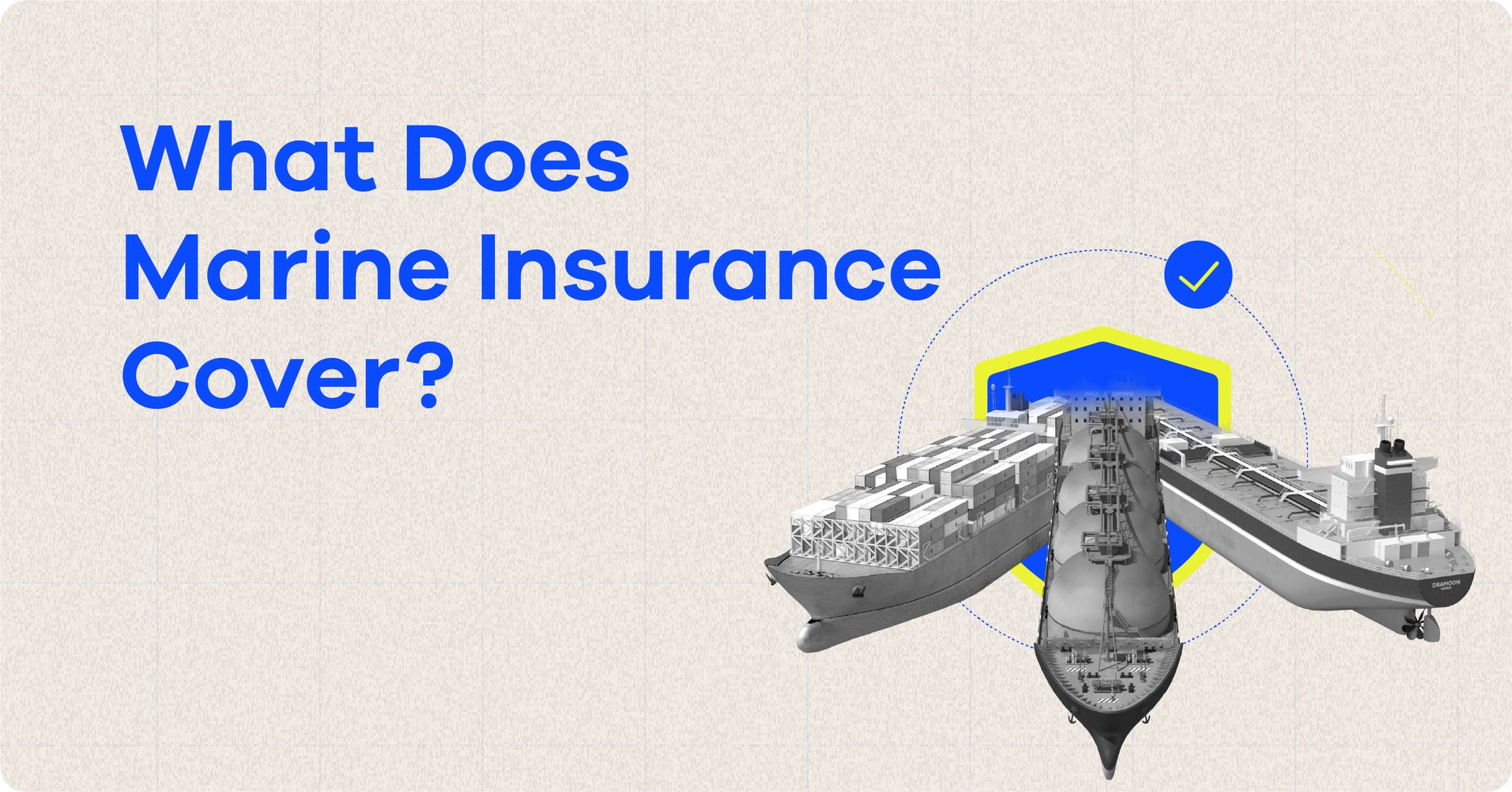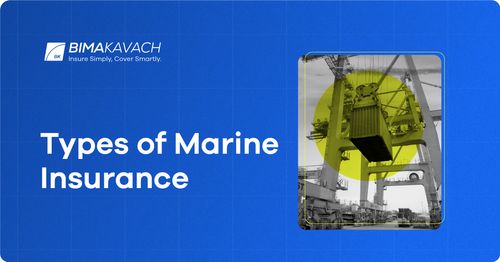Marine insurance is a crucial aspect of international trade and commerce, as it provides protection against financial losses resulting from maritime risks. The sea can be an unpredictable and dangerous place, and accidents, theft, and other perils can cause significant damage to ships, cargo, and even people. To mitigate these risks, various types of marine insurance policies are available to provide coverage and financial protection to parties involved in maritime activities. In this blog, we will explore the different types of marine insurance policies and their features, so that you can better understand how they work and how they can benefit you in the context of the maritime industry.
Before diving deep into the main topic, let’s turn our attention to the basics!
What is Marine Insurance?
A marine policy protects cargo or goods from loss or damage while being transported from the point of origin to the point of destination. Marine insurance policies come in a variety of forms, including those for road, air, rail and sea transportation, as well as courier and postal services. According to Section 5 of the Marine Insurance Act (MIA) 1906, marine insurance policies can be offered to anybody with an insurable interest.
The most prevalent reasons for marine cargo loss during transit are explosion, fire, hijacking, collisions, accidents, and overturns. A marine insurance policy may include carefully curated plans in addition to covering malicious damage, theft, damages during loading and unloading, non-delivery of products, and cargo mishandling. Coverage can be tailored to meet your specific needs, and it is available for a wide range of goods/cargo, whether you manufacture or trade them.
Different types of marine insurance in India
Before obtaining marine insurance, you should be aware of the different types of insurance offered so that you can choose the best one for your needs. The following are the various types of marine insurance:
- Hull & machinery insurance
A vessel's hull is the primary supporting structure in the absence of masts. In the event of a ship disaster, hull insurance covers the insured. Ship owners frequently adopt this type of marine insurance. Machinery insurance should be obtained in addition to hull insurance to cover the ship's machinery. It provides coverage for mechanical, operational and electrical ship machinery damage. As both sections cover the entire ship, they are often referred to together as Hull and Machinery Insurance.
2. Marine cargo insurance
Cargo owners incur the risk of cargo mishandling both at the terminal and on the ship's voyage. Their shipment could possibly be damaged, misplaced or lost as well. Marine cargo insurance is provided in return for a reasonable premium payment to protect the cargo owner from financial losses caused by such accidents. It also includes third-party liability cover, which compensates for any damage to the port, ship, railway track, other cargo, or individuals caused by your cargo.
3. Liability insurance
One common form of liability cover in marine insurance is Protection and Indemnity (P&I) insurance. P&I insurance provides coverage for a shipowner's or operator's liability for third-party claims arising from the operation of the insured vessel, including claims for bodily injury, property damage, pollution, and cargo damage. This insurance can also provide coverage for legal defence costs, which can be substantial in maritime disputes. In addition, this type of marine insurance policy often includes a range of additional coverages, such as crew liabilities, collision liabilities, and salvage liabilities.
Get Free Quote in Minutes
4. Freight insurance
This type of marine insurance policy can provide protection for the policyholder in case the shipment is lost or damaged during transit, resulting in the loss of the freight charges. If the goods are lost or damaged during transit, and the carrier is not liable for the loss or damage, the policyholder may still be able to recover the freight charges under their freight coverage. The coverage is typically tailored to meet the specific needs of the policyholder and can be adjusted based on the type of goods being transported, the value of the shipment, and the mode of transportation.

What does Marine Insurance cover?
Some of the major coverages provided by Marine Insurance are mentioned below-
- Fire accident
Fire accident coverage in marine insurance is designed to protect the insured against losses or damage caused by fire to the insured vessel or its cargo. in general, this coverage may include protection against loss or damage to the insured vessel or its equipment due to fire, loss or damage to the cargo on board the vessel due to fire and expenses related to firefighting efforts.
- Collison
Marine insurance may cover the damages to the insured vessel, including the hull, machinery, and other equipment, caused by a collision with another vessel, a pier, a buoy, or any other object in the water. The coverage may also include protection for damages to the other vessel or object that the insured vessel collided with, as well as third-party liability coverage for bodily injury or property damage caused by the collision. It may also include salvage costs, which are the expenses incurred in removing a damaged vessel from the water or repairing it.
- Sinking
This coverage compensates damage to a vessel and also to any cargo or property on board that may be damaged if the vessel sinks or capsizes. Additional expenses incurred as a result of the sinking, such as costs related to salvage and recovery attempts, may also be taken care of. The liability for damage inflicted to other vessels or property as a result of the sinking may also be covered.
- Reconditioning cost
This coverage may provide reimbursement for the cost of repairing or restoring a vessel to its original condition following a covered loss or damage. Reconditioning costs may include repairs to the hull, machinery, equipment, and other components of the vessel, as well as any necessary replacement of damaged or lost items. It may also include the cost of labour, parts, and materials required for the repairs or restoration, as well as any additional costs required to meet regulatory standards or obtain necessary permits.
- Damage caused by natural calamities
Marine insurance covers the cost of damage or loss caused to a vessel by natural disasters such as hurricanes, earthquakes, storms, and tsunamis. It includes any goods or property on board that is damaged or destroyed as a result of the natural disaster. Additional expenses incurred as a result of the natural disaster, such as costs related to salvage and recovery activities, as well as liabilities for any damage caused to other vessels or property, are also included.
- Overturning of ship
This policy covers the damage or loss to a vessel as a result of its overturning that may occur due to various reasons, such as heavy weather conditions, improper loading, or mechanical failure. It typically covers damage to the vessel and its machinery caused by overturning. The coverage may include the cost of repairs or replacement of damaged parts and equipment, as well as any additional costs required to bring the vessel back to its original condition. If the overturning of the vessel results in injury or damage to third parties, such as other vessels or coastal properties, marine insurance may provide coverage for the resulting liability claims as well.
- Stranding
This coverage covers vessel damage or loss caused by it becoming stranded on a reef, shoal, or other impediment. This coverage also includes any cargo or property on board that may be damaged as a result of the stranding.
- Explosion
Marine insurance may provide coverage for damage caused by an explosion that can occur due to various reasons, such as a malfunctioning engine or a fuel tank rupture. The coverage may include the cost of repairs or replacement of damaged parts and equipment, as well as any additional costs required to bring the vessel back to its original condition. If the explosion results in injury or damage to third parties, such as other vessels or coastal properties, marine insurance may provide coverage for the resulting liability claims.
- Discharge of distressed cargo
At times, a vessel carrying cargo may become unable to offload cargo at a specified port due to an insured peril, such as a storm or other natural calamity. As it needs to sail from that port within a specified time frame to honour other commitments, the carrier needs to classify the cargo as distressed cargo and try to get rid of it before it reaches the next port. This coverage may include the cost of transporting the cargo to its intended destination or a new port for delivery, as well as any storage or handling costs incurred while the cargo is awaiting transport.
The footnote:
With the different types of marine insurance policies available, individuals and businesses involved in maritime activities can obtain coverage tailored to their specific needs and circumstances. Whether it's hull insurance for shipowners, cargo insurance for freight forwarders, or liability insurance for ship operators, marine insurance policies can provide peace of mind and financial protection in the face of unpredictable events at sea. As the global economy and international trade continue to grow, the importance of marine insurance as a safeguard against maritime risks will only increase. We hope from the discussion above, you have got a fair idea of different types of marine insurance, what it includes and other related topics. For more information related to any topic in insurance, you may contact BimaKavach. Here, you can also get the best recommendation for any insurance product in just 5 minutes.

